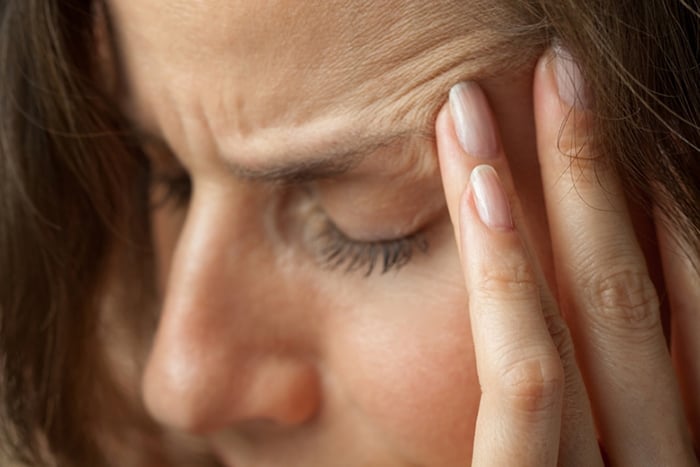
Stress affects our health and spirit, but does it lead to food cravings and weight gain?
Is stressed out the new normal? According to the survey Stress in America, released by the American Psychological Association in February, while average stress levels have decreased, 35 percent of Americans reported an increase in stress over the last year. And one in five Americans consider his or her stress extreme. Although having eustress — the stress felt while taking a test, during a job interview or before public speaking — can enthuse or excite, negative stress caused by financial woes, work struggles or family pressures takes a toll physically and emotionally. Left unchecked, chronic stress can contribute to everything from anxiety and muscle pain to high blood pressure, depression, heart disease — and even obesity.
Does Stress Affect Weight?
While there are many ways people cope with stress (see Learn to Stress Less), Stress in America reveals that 36 percent of participants report overeating or eating unhealthy foods, and 27 percent report skipping meals over the last month in response to stress. However, despite the common belief that stress directly leads to weight gain, epidemiologic research shows inconsistent results. Bringing together 14 prospective studies that followed more than 23,000 men and women for up to 38 years, a metaanalysis found only a very small association between stressors (such as a traumatic event or work stress) and weight gain. Published in the June 2011 issue of Obesity, this study also showed effects of stress were stronger in men than in women.
According to a similar review published in the August 2007 issue of Nutrition, while there’s evidence that stress contributes to either under- or overeating, some long-term studies suggest that being stressed contributes to weight gain, perhaps by increasing stress-induced eating (especially of fatty or sugary foods that are easy to over-consume).
Cravings and Comfort Foods
Several studies suggest that while stress may not always lead to consuming more calories — some people eat less and lose weight when stressed — it’s likely to lead to less healthy food choices. In a study published in Appetite in 2012, researchers found that normal weight and obese women who felt stressed had a greater drive to eat — they were more likely to binge eat and less able to control their eating — and were therefore more likely to gain weight.
Other studies suggest that those who are female, overweight or consciously restrict food intake may be more likely than others to respond to stress by altering their eating habits. In a previous study published in Psychosomatic Medicine in 2000, researchers measured eating attitudes and food preferences in 68 healthy men and women and found that while stress did not alter overall intake or appetite, stressed emotional eaters ate more sweet high-fat foods and more energy-dense meals than unstressed and non-emotional eaters. Although more research is needed for firm conclusions about how stress relates to body weight, food intake and food preference, consuming a diet rich in fruits and vegetables, nuts and seeds, legumes, low-fat dairy foods, fish, eggs, lean meats and poultry provides vital nutrients needed for mind and body. Eating every few hours can help keep blood sugar levels steady and prevent excessive hunger.
Staying hydrated, being physically active and getting adequate sleep (about seven hours a night) can also help temper stress. Learn to stress less Lynn Bufka, PhD, clinical psychologist and assistant executive director for practice research and policy at the American Psychological Association, offers the following tips:
- Relax
It’s vital to learn how to physically relax. Progressive muscle relaxation, visualization, guided imagery, mindfulness and even something as simple as learning to breathe through your diaphragm rather than through your chest are techniques that can calm your body and set you up to better manage stress. - Change Your Thoughts
The way in which people interpret stressful situations may also add to stress. Changing the way you think about or frame stressors through psychotherapy or other means can help you cope with current and future stressors in a more positive, productive way. - Get Out and Move
Physical activity is one of the most effective ways to temper stress. Exercise helps you not only stress less, but digest better and sleep better. Going to a park or some other green space or simply getting some fresh air can really improve your outlook and perspective on life. - Connect and Confide
Finding a friend or family member to talk to about the stress you’re feeling also can help settle you. There’s nothing wrong with asking someone close to you to just listen, and provide advice if that’s what you think you need. - Think Small
Making small, sustainable changes in how you cope with stress on a slow, gradual basis can help you make bigger long-term changes. Whether that means taking a short walk rather than drowning your sorrows in a bowl of ice cream, or keeping healthful snacks on hand as an alternative to skipping meals, Bufka says that over time these simple, small changes can add up to improved coping in the face of stress over the long haul.
“If you find that the way you respond to stress interferes with your ability to function as a parent, spouse, worker or student — or if you feel your stress is distressing — it’s wise to seek help from a licensed psychologist or other mental health expert,” says Bufka, adding that people who often feel overwhelmed or physically ill, who are not enjoying life or have trouble sleeping may benefit from professional help.
